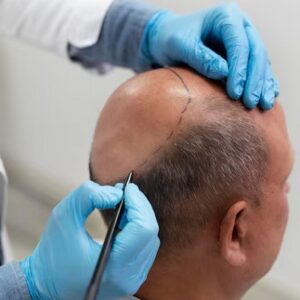
A hair transplant will make you happy with your appearance and restore your confidence. Therefore, it transforms your life. However, if your initial hair transplant does not go as planned or if you keep losing hair following the operation, what then? In this instance, you can require a second hair transplant. This blog addresses Second Hair Transplant – When Is It Necessary?
Why Consider a Second Hair Transplant?
People usually need a second hair transplant for a few key reasons. Knowing these will help you decide whether another treatment might better suit you.
Continued Hair Loss:
Some patients could keep losing hair in areas not treated following a hair transplant. A second transplant is required to close the gaps and give the hair more thickness since this might cause it to seem spotty or uneven.
Insufficient Coverage from the First Transplant:
Sometimes, the first hair transplant might not provide the proper level of coverage. This could occur if the hair loss is substantial at first. A second transplant can fill these voids and give the hair a more natural look.
Desire for More Density:
While some people are content with their first transplant, others wish their hair density to be better. With a second treatment, mainly if the first transplant was conservative, one can achieve a thicker, fuller appearance.
Refinement of Results:
The first move might leave some minor defects or anomalies. A second transplant can help you make the baldness seem better, correct any issues the previous one neglected, or bring the head more in line.
Second Hair Transplant – When Is It Necessary?
Timing is crucial if you choose to have another hair transplant. Second Hair Transplant – When Is It Necessary? Hence, if you rush into another operation too quickly, the results could not be as favorable as they should be. Regarding time, you should be aware of:
Allow Time for Full Healing:
Your skull needs plenty of time to heal and the transplanted hair time to flourish. Most patients find that the full results of a hair transplant take 12 to 18 months to manifest. This period allows you to observe the final results and determine whether you require a second transplant.
Assessing Continued Hair Loss:
Should you continue to lose your hair, you should wait until the loss stops before considering another transplant. Medications can help slow down or stop hair loss, therefore enabling the possibility of a second transplant.
Consult with Your Surgeon:
You should speak with your hair transplant surgeon to find out whether you require a second operation. Working together, you may create a strategy to achieve the greatest outcomes and meet your objectives.
Factors to Consider Before a Second Hair Transplant:
Consider the following before a second hair transplant:
Donor Hair Providers:
The success of a second transplant depends much on the availability of donor hair. To find enough hair for another treatment, your doctor will examine the density and quality of the hair you donated.
Realistic Expectations:
One should be aware of their expectations from their second transplant. Although it may not stop all of your hair loss or produce hair as dense as natural hair, a second treatment could make the first one perform better.
Overall Health:
Any surgery’s result depends on your general level of health. You must be in good health, free from long-term diseases, and be following all of your medications exactly before having a second hair transplant.
Type of Procedure:
The second hair transplant you obtain may differ from the previous one. Your needs and the condition of your scalp will determine which technique will work effectively. Your surgeon can advise on the direction that would be most suitable for you.
Benefits of Second Hair Transplant:
People who require it might consider a second hair transplant for several reasons.
- The second procedure fills in areas not adequately covered in the first transplant, enhancing overall coverage and density.
- A second transplant can boost self-esteem by achieving the desired results.
- Advancements in hair transplant techniques allow for realistic results, including straightened hairline and correcting defects.
Final Thoughts:
A second hair transplant could help you to attain the desired hair density and thickness. A second treatment can significantly impact things, whether due to ongoing hair loss, inadequate coverage from the first transplant, or the desire for additional density. To acquire the finest results, however, time, preparation, and acceptable goal attainment are vital.
Consulting a highly experienced hair transplant surgeon at Dynamic Clinic Pk will enable you to make wise decisions and acquire the desired appearance.












